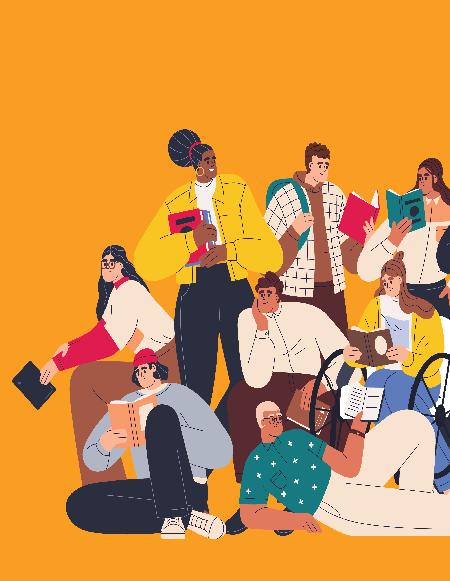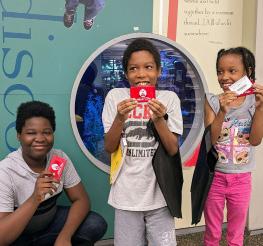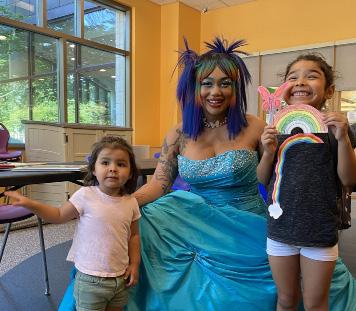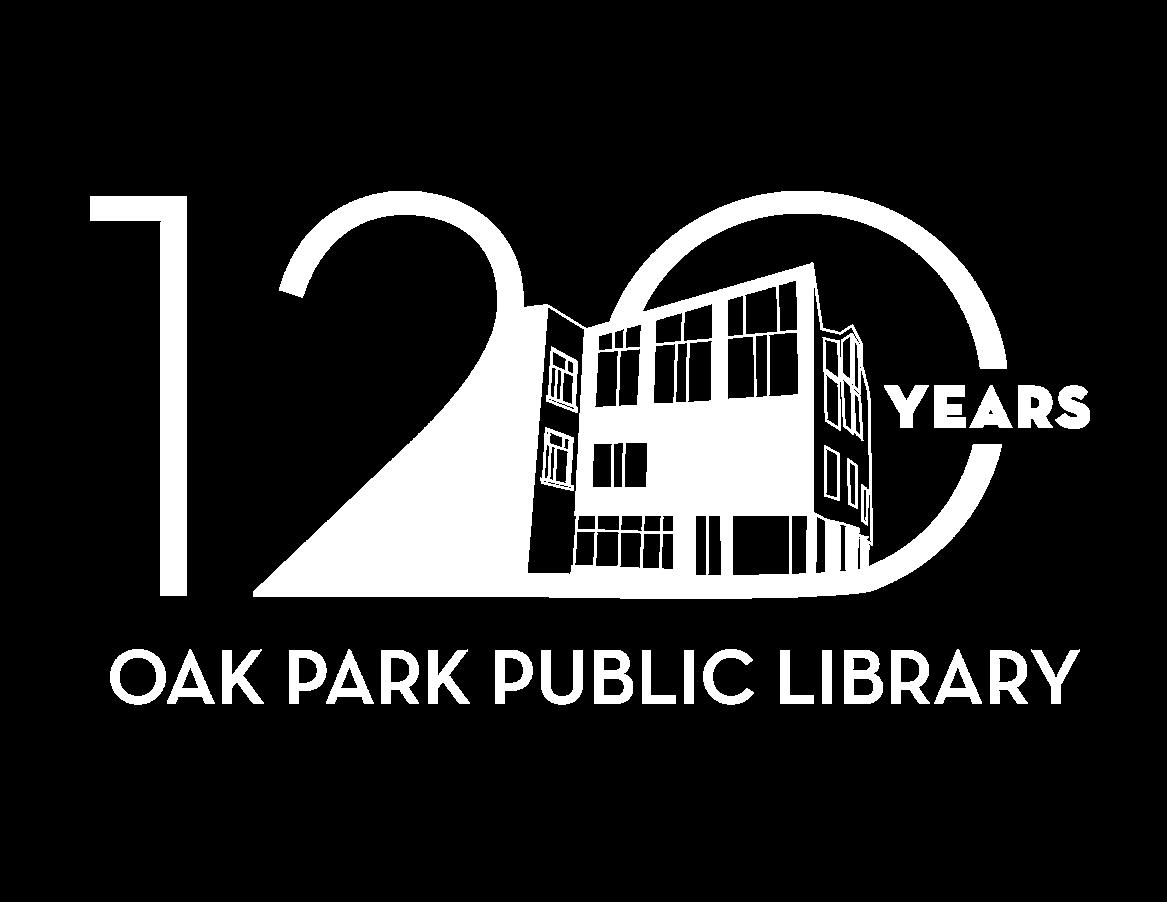Rising to meet the moment
This fall, we celebrate 120 years as Oak Park’s public library.
As we look back over our history, what really stands out is all the good that libraries bring to their communities and to our nation’s democracy as a whole.
It all started here in 1903, when Oak Parkers voted to turn the Scoville Institute, originally a private subscription library at 834 Lake St., into a taxpayer-funded public library. Since then, Oak Park has constructed two different Main Library buildings on the original Scoville site, expanding both its spaces and offerings over the years to meet the needs of the community, as well as adding the Dole and Maze branches.
At the heart of it all, though, libraries are fundamentally about access to information and resources—and yes, books!
For this, the current moment is troubling, with rising censorship attempts and even threats of violence to public libraries across the country. The freedom to read is essential to our democracy, yet it is continuously under attack and must be protected. We will never be neutral about defending it.
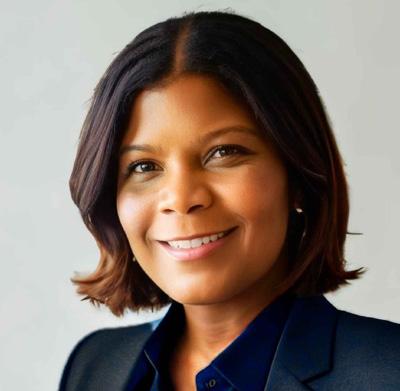
Because that’s what libraries do. They grow with the times. They rise to meet the moment. We know that libraries today offer so much more than books, including digital makerspaces, a sense of belonging, and even pop-up barbershops.
That’s why Oak Park became a Book Sanctuary Community earlier this year. It’s why our library has continued to support the American Library Association’s Freedom to Read statement since it was first issued in 1953. And it’s why we’re offering programs this fall that explore intellectual freedom, censorship, and book bans. Please read on to learn more and get involved.
As always, thank you for using and supporting your public library!

—Executive Director Joslyn Bowling Dixon
3

Growing with the times
Wh en Adele Maze became an Oak Park librarian in 1920, children’s storytimes were usually held only on holidays. But Maze, who was active with the Camp Fire Girls and Girl Scouts, changed all that. She introduced a weekly story hour for children, plus a checkers club, a play club, and more at the South Branch, which was the name of the library branch at 845 Gunderson Ave. at the time.
Maze (pictured above in the 1950s) is best remembered for the services she provided for children, as well as for envisioning the library as a community center and working with other organizations to provide better services. When she died in 1957 after a 38-year tenure, the South Branch was almost immediately renamed in her honor.
As Wednesday Journal columnist Ken Trainor wrote in an April 2021 love letter to the branch (“Maze: A Storybook Place to Dream”): “There was church and school, the ballfields, candy stores, and Maze Branch. All the institutions a kid needed in South Oak Park in the late 1950s, early ’60s. Maze was where I went to dream.”
Adele Maze’s legacy shows us how one person can do so much good for a community. And her work to transform the library into what she called “a friendly, happy place as well as a storehouse of books and knowledge” is one example of how the Oak Park Public Library has, over its 120 years, expanded and adapted its offerings to meet the needs of the community.
Expanding & revamping
Over the years, the library has revamped and rebuilt its spaces to better serve patrons. In 2005, Maze Branch closed for renovations to


make it more accessible. A new elevator and front entrance ramp were added to the 1936 building, making it possible for more community members to use the library.
Similarly, the Main Library as we know it today is actually the third library building to stand at 834 Lake St. Some readers may remember the previous Main Library building, which stood from 1964 to 2002. Designed by the architectural firm of Holabird and Root, it replaced Oak Park’s first library building, the Scoville Institute, when the library outgrew the building. Then, starting in 1977, this new Main Library building was expanded to add a children’s area, an audiovisual area, computers, and large-type books for visually impaired readers.
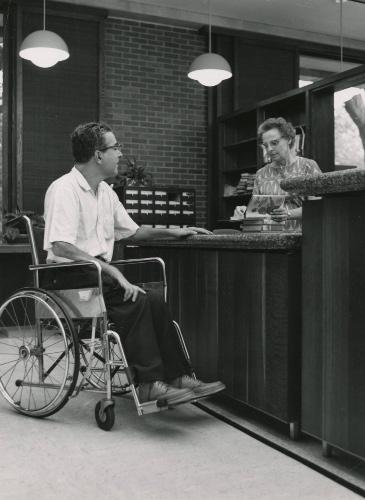
“All of these activities were fun for both youngsters and grownups and were instrumental in making all realize that the library was a friendly, happy place as well as a storehouse of books and knowledge.”—Adele Maze
However, the library eventually outgrew this building as well. In 2002, it was demolished, and the current Main Library opened in October 2003, at more than double the size of the previous building and with flexibility to meet future needs. You can find more about the history of all three library locations at oppl.org/about/history
4
Librarian Adele Maze helps children at the South Branch (later renamed after her), 1950s
Community members Main Library, August
Patrons at the first Main Library, built in 1964
A patron borrows books at the first Main Library, built in 1964

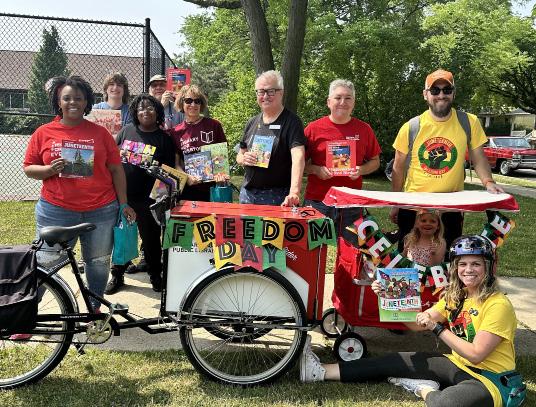

Today, the library continues to respond to our community by being flexible with spaces and more. For example, in the past couple of years we’ve dedicated areas on the second floor for middle schoolers and high schoolers, plus staff who specialize in the interests and needs of kids in these age groups. In April, we opened the thirdfloor Creative Studio, a digital makerspace where you can digitize old VHS tapes, make 3D-printed designs, and record audiobooks, podcasts, and more. And this fall, we’ll launch an exciting new Library of Things collection, lending items like recreation equipment, crafting tools, and more.
Stay tuned for news about this cool new collection and other offerings by signing up for emails at oppl.org/subscribe.
Becoming a Library for Everyone
Reflecting midway through her first year as the first Black female executive director of our library, Joslyn Bowling Dixon writes, “I am proud of the anti-racism and equity work our library has accomplished so far, and I am excited for the next chapter.”
But there is still work to be done, Dixon says.
“As a Black female in the executive director chair—still a rarity in the library world—I never forget from whence I came, and the career and educational journey it took to get here,” she writes. “Antiracism is an action I put into practice every day, with the intention of creating equitable pathways to career and continuing education
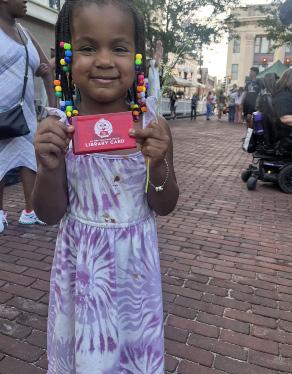
opportunities for all library staff members.”
In the 2024 library budget, equity and anti-racism work will be supported with its own independent budget, including things like continuing education for staff and patrons, creating and sustaining safe places for dialogue, and providing access to resource guides, peace circles, book discussions, and more.
“Now is the time to commit to new equity and anti-racism work,” Dixon says, “and to continue creating the community impact that has earned us a national reputation as leaders within our profession.” Learn more about our work at oppl.org/anti-racism
Dedicating more to sustainability
In April, Christine Poreba became the library’s new Environmental Programming Specialist. Since then, she has worked with community partners, including the Village of Oak Park, to bring environmental and sustainability programs to the library.
“I’m sensing a real interest and desire from community members to learn and expand on sustainability opportunities,” she says.
For example, residents have learned about home energy improvements, electric vehicles, and solar power through Citizens Utility Board workshops at the library. And in August, more than 80 participants joined a community discussion at the Main Library on the Village’s climate plan, Climate Ready Oak Park.
“It was energizing to see the great turnout and all the dedication of the leaders and members of local environmental groups,” Poreba says. “I’m in the process of brainstorming more ways of connecting community members with the information and knowledge of local experts.”
This fall, join our new book discussion series Earth Lounge, which meets on the last Wednesday of the month, to explore the curiosities and complexities of nature, environmentalism, and sustainability through fiction and nonfiction. Find this and more programs, and learn more about the library’s ongoing commitment to sustainability, at oppl.org/sustainability.
5
members discuss Climate Ready Oak Park, August 2023
Library board and staff with the Book Bike at Oak Park’s Juneteenth Parade, June 2023
Young cardholder at Oak Park’s Thursday Night Out, July 2023
Kids at the first Main Library building, circa early 2000s

The freedom to read is guaranteed by the First Amendment of the U.S. Constitution, yet that freedom continues to be challenged. We are not neutral about defending it.
Across the United States, a movement has been growing to censor books in schools and public libraries. Last year saw the highest number of attempted book bans in 20 years, according to the American Library Association (ALA). Overwhelmingly, these attempts target books by and about people of color and members of LGBTQ+ communities.
In Oak Park, our public library provides access to a wide range of reading materials crucial to democracy. We’ve long upheld the freedom to read through our policies and practices. Seventy years ago, the ALA issued its Freedom to Read statement, which boldly declares that the freedom to read is essential to our democracy, yet is continuously under attack and must be protected. Our library has signed on to this statement since it was first issued in 1953, and our library board reaffirmed it earlier this year—because today, as ever, libraries including ours must guard the freedom to read, to provide free and open access to information.
Oak Park is a Book Sanctuary
Earlier this year, our library worked with the Village of Oak Park to declare our community a Book Sanctuary. This means, among other things, that Oak Park affirms the values of democracy, intellectual freedom, and reading diverse and inclusive books. And similar to new state legislation that outlaws book bans in Illinois schools and libraries, the Village of Oak Park has declared it will not provide financial or other support to any business, organization, or governmental entity that supports or accomplishes book banning. As your public library, we will continue to make challenged and endangered books accessible to everyone, and to educate our community on the history and current reality of book challenges and censorship attempts.
Below, we talk with a few of the panelists for this year’s Barbara Ballinger Lecture, which will dive into intellectual freedom, book bans, and censorship. Please join us at this and other events (see page 7), and learn more at oppl.org/freedom.
Oak Park is known as a progressive community, and earlier this year we became a Book Sanctuary Community. Illinois also has elected officials who generally support libraries, plus a new state law that protects against book bans. Still, what would you say to someone who might think that book censorship attempts couldn’t happen in a community like Oak Park?
Emily Knox, associate professor, University of Illinois at Urbana-Champaign: “Censorship attempts happen in all communities and for all sorts of reasons. People censor books from the left, the right, and all points in between. All libraries (and schools!) should be prepared to respond to these requests.”
Kelly Jensen, Book Riot: “Unfortunately, it does not matter how progressive you believe your community to be. People working to remove books do not care about borders, nor do they care about whether or not the library they target is the one they use. The truth is book bans—and the stochastic terrorism being experienced by public and school libraries—is in every community and/or will touch every community in some capacity. We’re entering the third year of this manufactured crisis and it’s not letting up any time soon. Instead, we’ll continue to see new and more dangerous tactics employed. At the end of the day this is not, nor has it ever been, about books. The books are simply the tool to push forth hateful, bigoted beliefs.”
John Chrastka, executive director, EveryLibrary: “Book bans aren’t always about the First Amendment. In many places, book bans are used as direct attacks against LGBTQ+ and BIPOC communities. In those places, attempts to ban books are attempts to silence stories and erase people. Our part of Illinois is more progressive than many places, but we are seeing calls to ban books in suburban Chicago. It is being resisted in places like Downers Grove, where the Proud Boys have shown up to protest books, and in Lincolnwood, where the fight for the freedom to read is about whose stories get to be told. Oak Park’s inclusive ethos and diverse community are a reason people move here and want to raise their families. But no library is immune from outside attacks or the soft censorship that comes from secondguessing whose stories are valid. It takes vigilance and true dialogue to focus on equity.”
6
What can the average person do to support their libraries and the freedom to read?
Jensen: “It’s simple: show up to board meetings, either in person or via email, letting the board know what your library is doing right. Check materials out and recommend materials, especially those by or about marginalized people. Write to and get into the ears of local, state, and national elected officials whose job is to work for you and demand they protect the First Amendment Rights of all.
Tell your library workers they are doing a good job and you appreciate their work. This is not the message they’re receiving from the media and even if it feels ‘small,’ it can make their day, week, or month.”
Knox: “Read banned books! Support the authors who are targeted. Show up at your local board meetings. Learn more about the history of the freedom to read and why it matters.”

Learn more & register: oppl.org/calendar
Community Open House: Celebrating the Freedom to Read
Sunday, October 1, 1–3 pm, Main Library
Learn how to support the fight against book bans nationally and locally. First 120 visitors get a “Freedom to Read Kit.”
BOOK CHALLENGES ON THE RISE: SUPPORT YOUR FREEDOM TO READ
Monday, October 2, 7– 8 pm, Main Library and virtual Learn about Illinois’ legislative response to book challenges, the implications of censorship on communities, and how to effectively support intellectual freedom, in this webinar moderated by syndicated columnist Heidi Stevens. Panelists are Alexi Giannoulias, Illinois Secretary of State and State Librarian; Monica Harris, executive director, Reaching Across Illinois Library System; and authors of challenged books Jasmine Warga and Jarrett Dapier.
Barbara Ballinger Lecture:
Discussion on Intellectual Freedom, Book Bans & Censorship
Saturday, November 11, 1–2 pm, Main Library and virtual Join us for a panel discussion featuring Emily Knox, associate professor in the School of Information Sciences at the University of Illinois at Urbana-Champaign; John Chrastka, founder and executive director of EveryLibrary; Kelly Jensen, editor at Book Riot; and Dr. Lucy Santos Green, Director of the University of Iowa School of Library and Information Science.
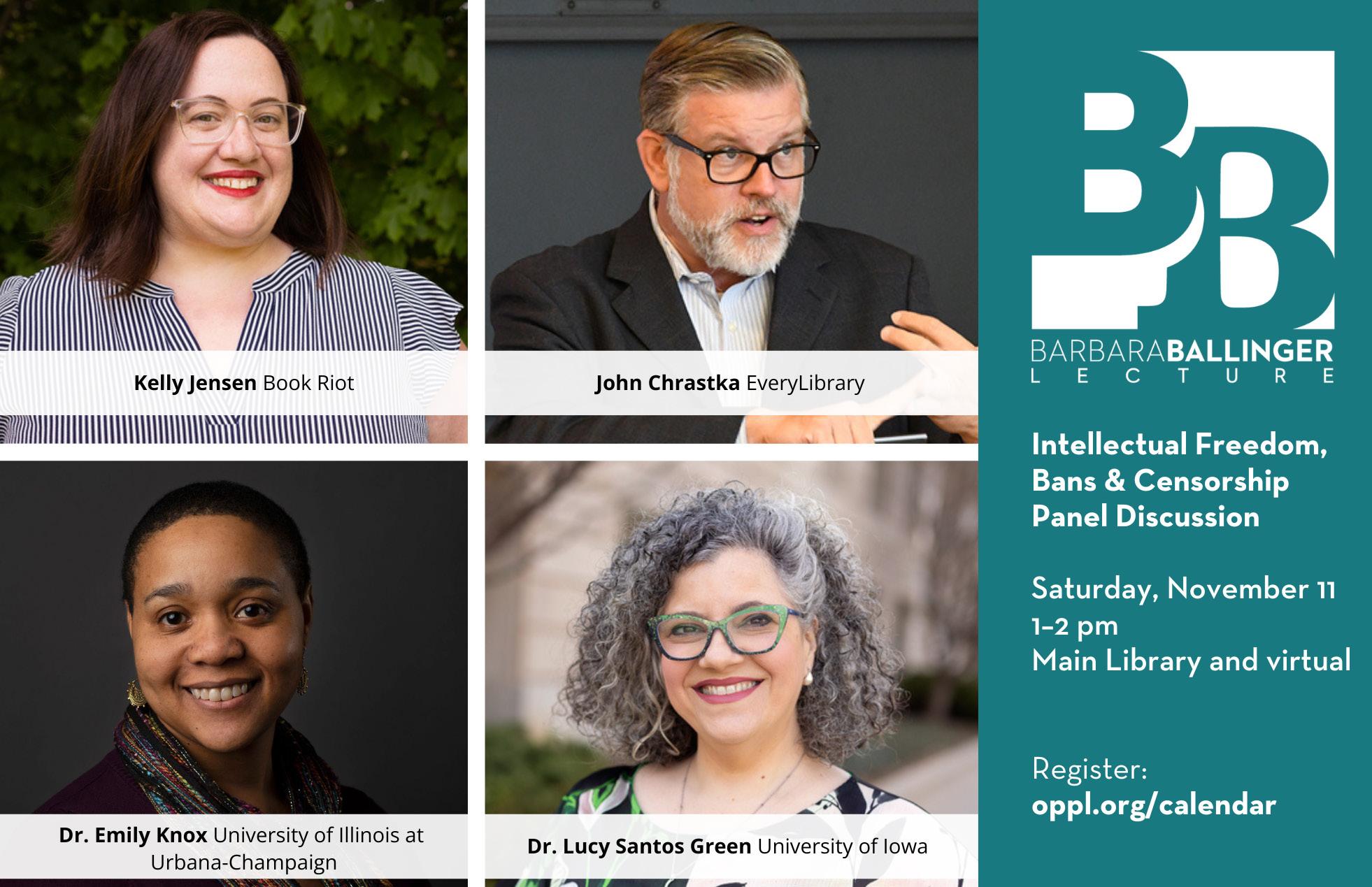
Helping you flourish in a digital age
We are committed to preparing people for continuously changing technology. Here are a few stories of how Oak Parkers are using library technology, digital learning services, and staff expertise to improve their lives. See resources available to you at oppl.org/digital.

Going past the paywall
When Robert Kelly was working in the software industry, he subscribed widely to magazines and newspapers from around the country. After he retired, however, the cost of all those subscriptions really started to add up.
“I like to be able to read a lot,” he told us. “Because there’s so much going on in the world, I like to have a variety of opinions.”
Thankfully, he attended a Drop-In Tech workshop at the library this spring and learned how to access the newspapers and magazines he likes for free with his library card. And now he’s able to get full access to the The New York Times and The Washington Post websites, read The Atlantic on Flipster, and use PressReader to keep up with the Chicago Tribune, the Chicago Sun-Times, the Los Angeles Times, and the Atlanta Journal-Constitution.
“It really hit the spot for me,” he told us. “I can continue to read the authors and articles I like and not have to pay an arm and a leg.”
Mr. Kelly said he now even prefers to read digital versions, on either his laptop or smartphone. One reason: “I don’t have to hold
a newspaper in my hand, start on page 1 and have to go to page 25 to finish the article.”
Access newspapers and magazines with your library card at oppl.org/newspapers and oppl.org/magazines
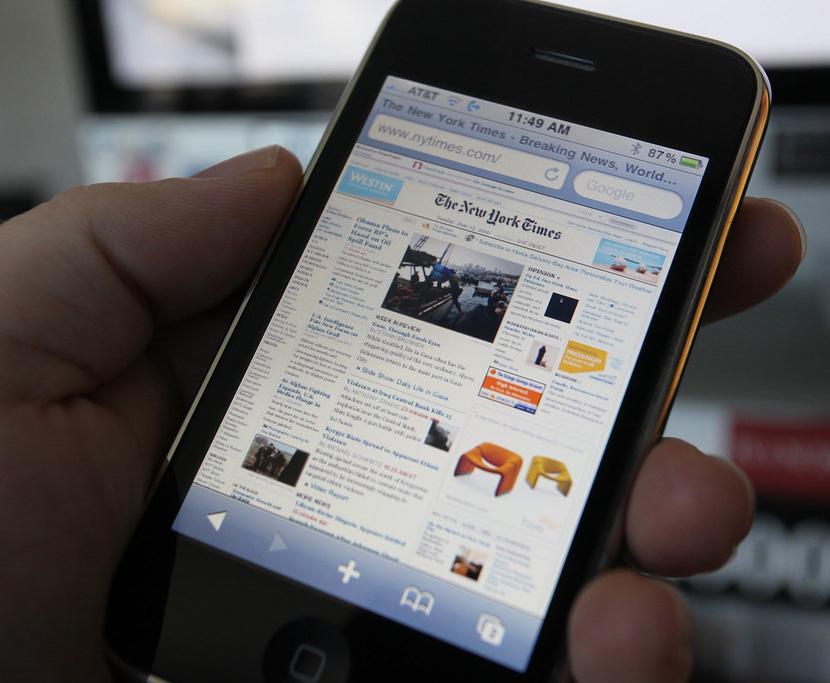
Sign up for Tech Tips!
Get technical tips and tricks delivered to your inbox. Subscribe to the monthly email newsletter at oppl.org/subscribe.
8
Robert Kelly (shown here with his grandchildren at the Main Library) now gets his news digitally through the library.
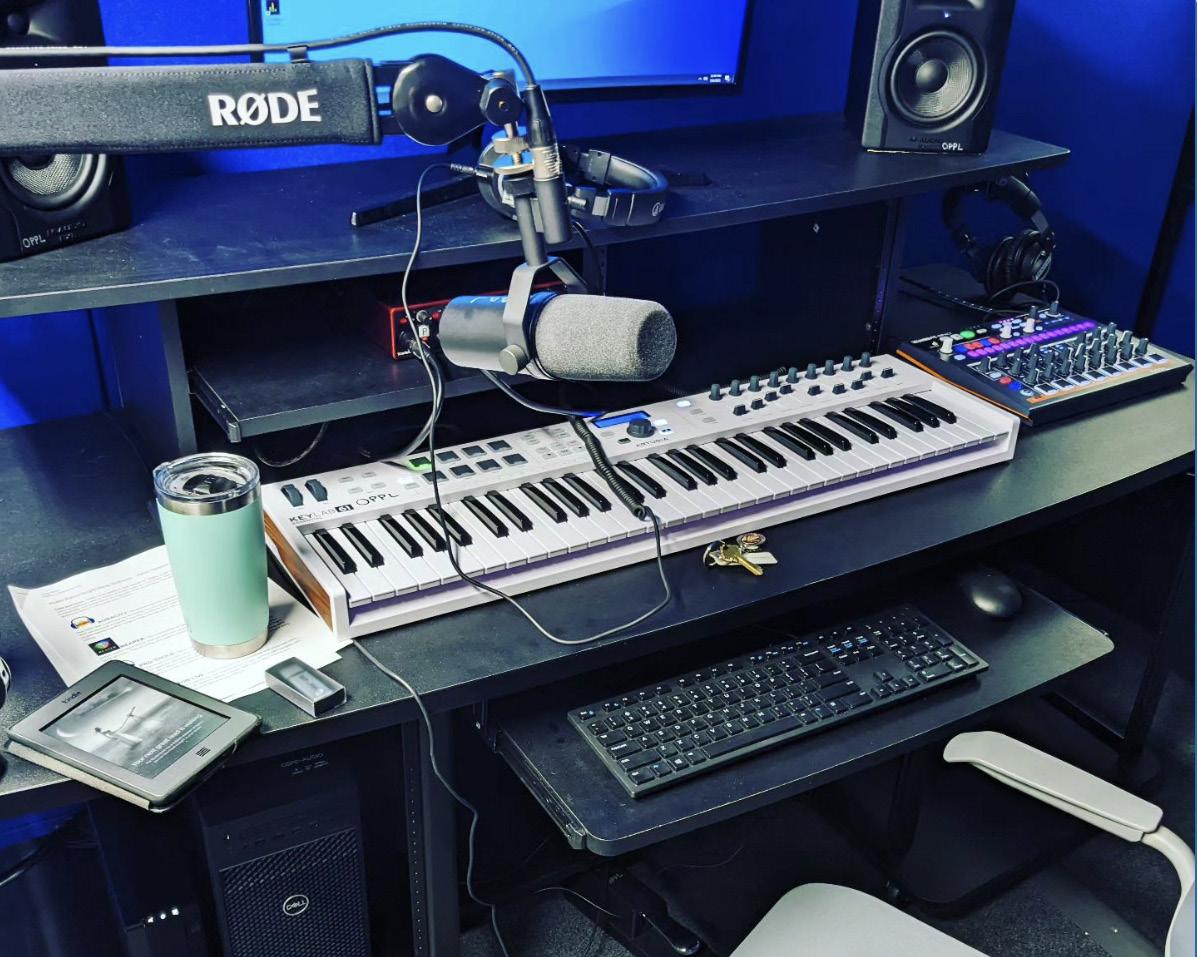
Recording an audiobook
Author Gwen Tolios has been using the Audio Booth in the Main Library Creative Studio to record and edit the audiobook to her third book, Fae Deals and Other Tales
“I'm still learning, but super excited to do so!” she told us. “I really appreciate library staff answering questions.”
Learn more about using the Audio Booth and other Creative Studio equipment at oppl.org/creative-studio
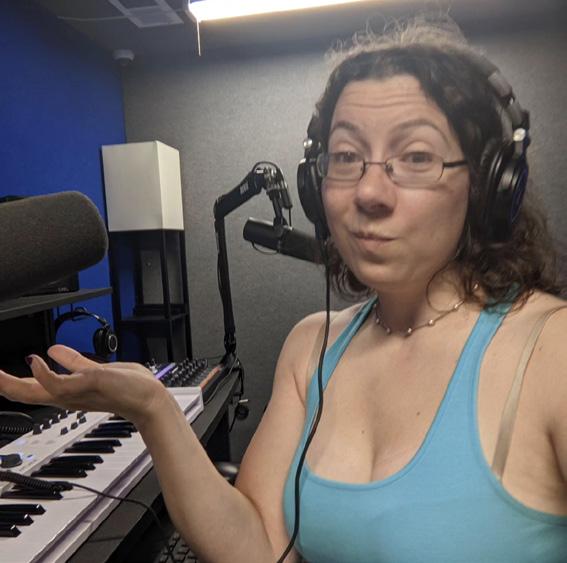

‘This
has been so freeing’
A few years ago, Sharon Eckhoff inherited a Mac laptop from her son. She loves pretty much everything about it, including the sensory feel of typing on it.
“It’s a pleasure to work with the darn thing,” she told us.
However, she realized earlier this year that, to keep up with her online courses in Vedic astrology, she needed more storage and software updates. She needed a new computer.
Frustratingly, the new computer she purchased was not a Mac. And for someone who’s used to one, a PC can be a whole different world. Eckhoff had to adjust, and she needed help.
So she scheduled a Learning Lab, which is a one-on-one session in which you can get guidance on a technical topic directly from a library staff member.
“Having things explained in a variety of ways until the content clicks for me is fantastic,” she said.
For Eckhoff, her sessions with Digital Learning Specialist Amelia Vargas allowed her to progress at her own speed, work on the exact things she needed, and free her from “being a burden in other relationships,” she said.
While she still uses her Mac when she can, Eckhoff said the Learning Labs helped her deal with “all the surprises and the learning curves.” And she’s since come to terms with the PC: “I have learned to manage this beast!”
Schedule your own Learning Lab at oppl.org/labs.
Free printing
“I use the Maze Branch often,” one cardholder told us in a July survey. “Thanks so much for computer and printer access. Also your team members are always helpful.”
Cardholders can print up to 50 pages for free each day. Learn more about printing, scanning, faxing, copying, borrowing mobile hotspots, and using public computers, laptops, and other devices at oppl.org/technology.

9
Patron Services Supervisor Alex Nall with the printer at Maze Branch.
Drop in for tech help on the last Thursday of the month, 10 am– noon, at the Main Library. More: oppl.org/calendar
Hip Hop at 50
“Hip hop is not just rap. It’s a way of life.” —Multicultural Learning Coordinator Juanta Griffin
Oak Park Public Library was one of more than 30 organizations around the country— including libraries, museums, colleges, universities, and archives—partnering for Collections of Culture: 50 Years of Hip Hop Inside Libraries, Museums and Archives. As part of the initiative, our library held a fashion show, film screenings, spoken word and arts workshops, a T-shirt design contest, karaoke in the Idea Box, and more.
Topping off the six-month celebration, library staff Stephen Jackson, Juanta Griffin, Latonia Jackson, and Chibuike Enyia traveled to New York City for the two-day Hip Hop 50 Summit, where they met
This project was made possible in part by the Institute of Museum and Library Services.
hip hop icon Ralph McDaniels, Queens Public Library Hip Hop Coordinator and cofounder of TV’s Video Music Box (pictured on next page, center right).
Hip hop permeates American life, says Director of Equity & Anti-Racism Stephen Jackson: “It is the way people talk, the words they use, the way people wear their clothes, and yes, it is music and dance, but way much more. It was born out of taking resources out of already impoverished communities and the community members using what they had available to get what they needed. Look at it now. Hip hop, I am proud of you.”
Learn more at oppl.org/hiphop50
10
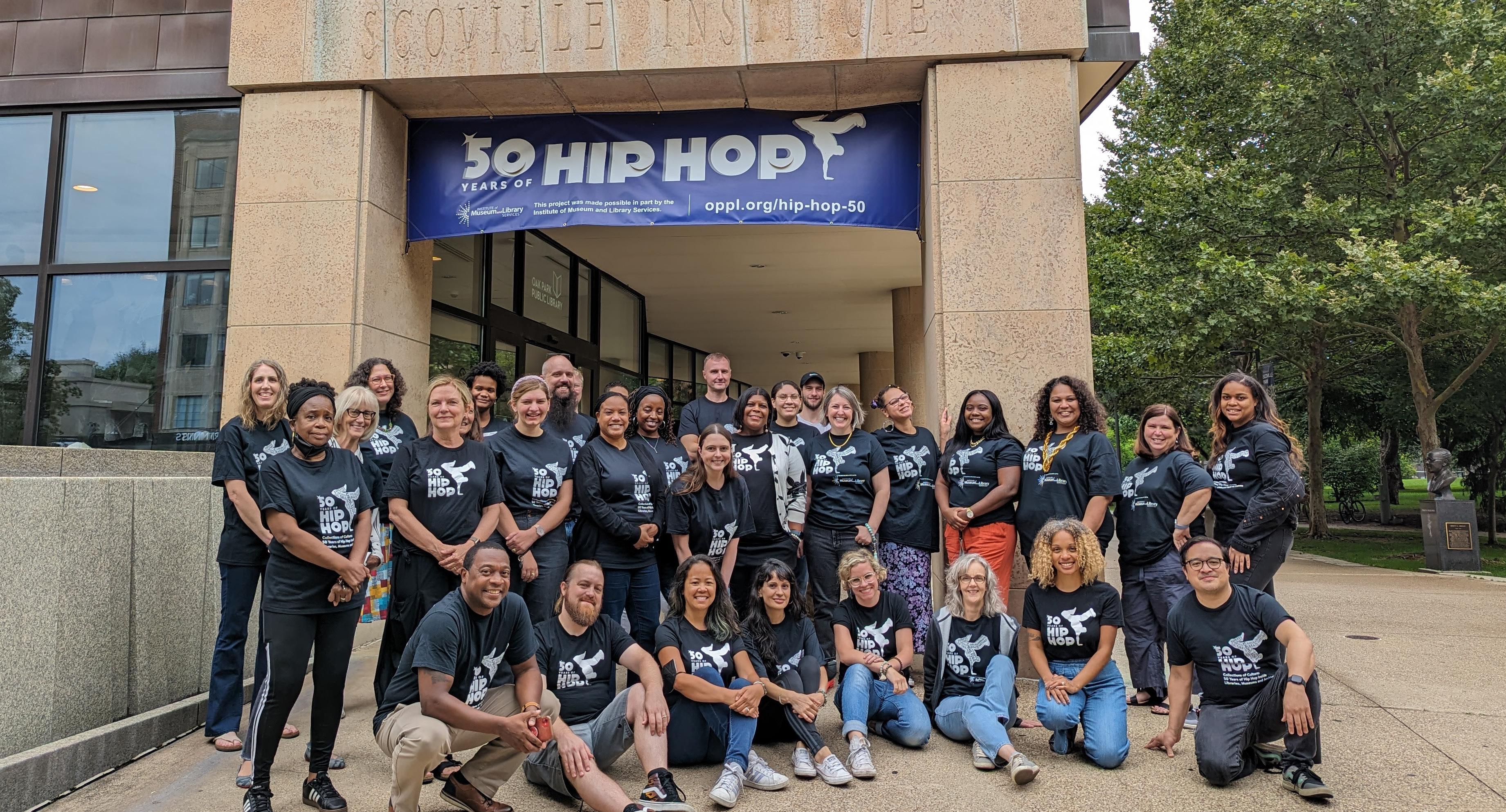
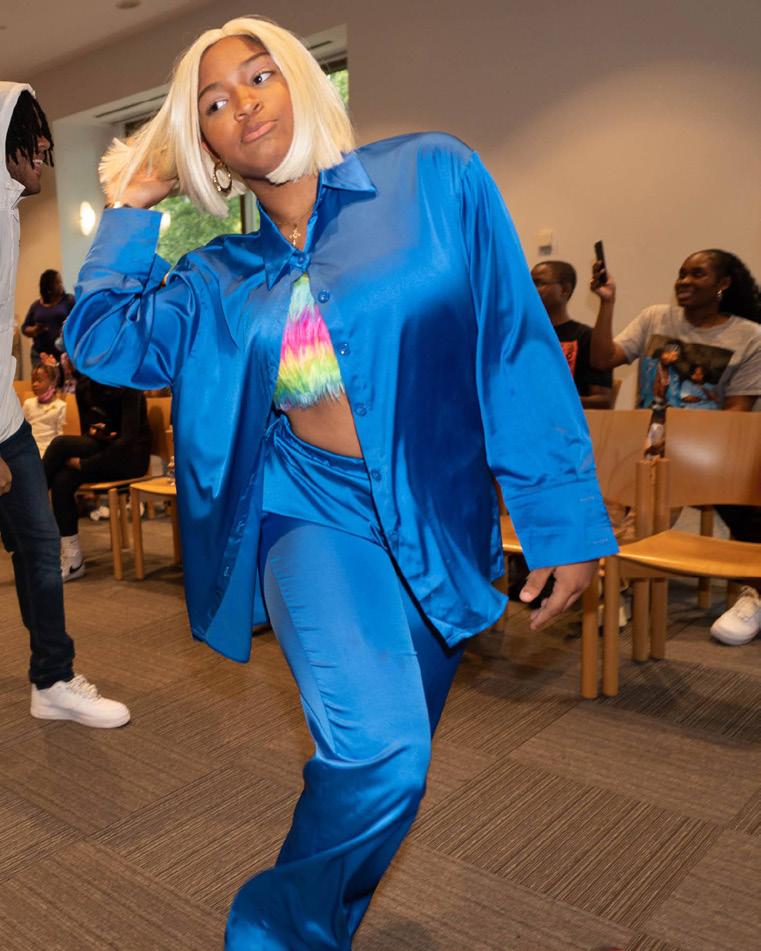
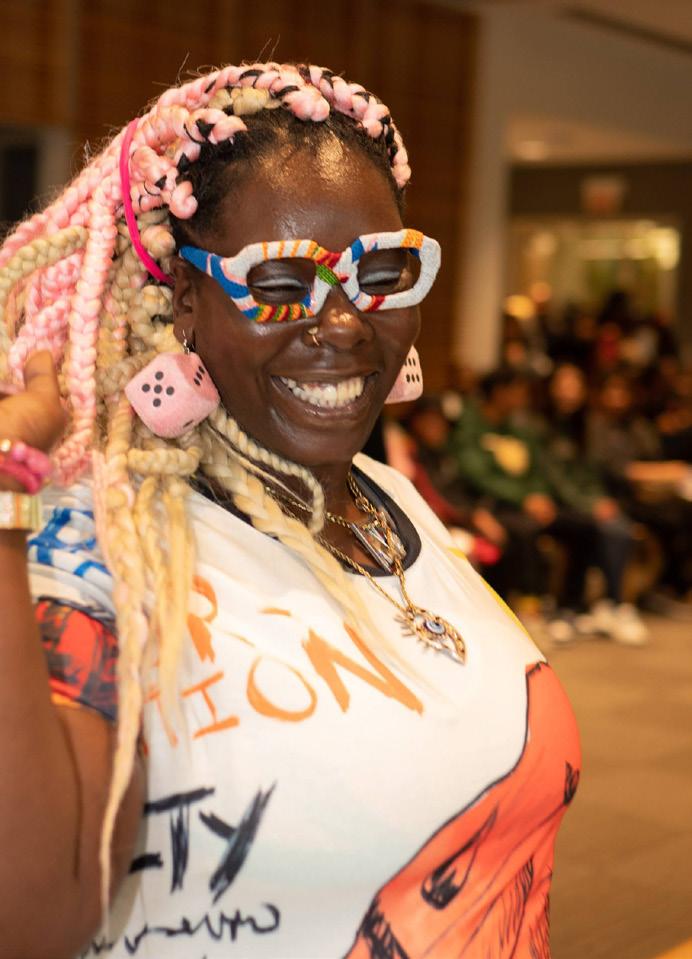
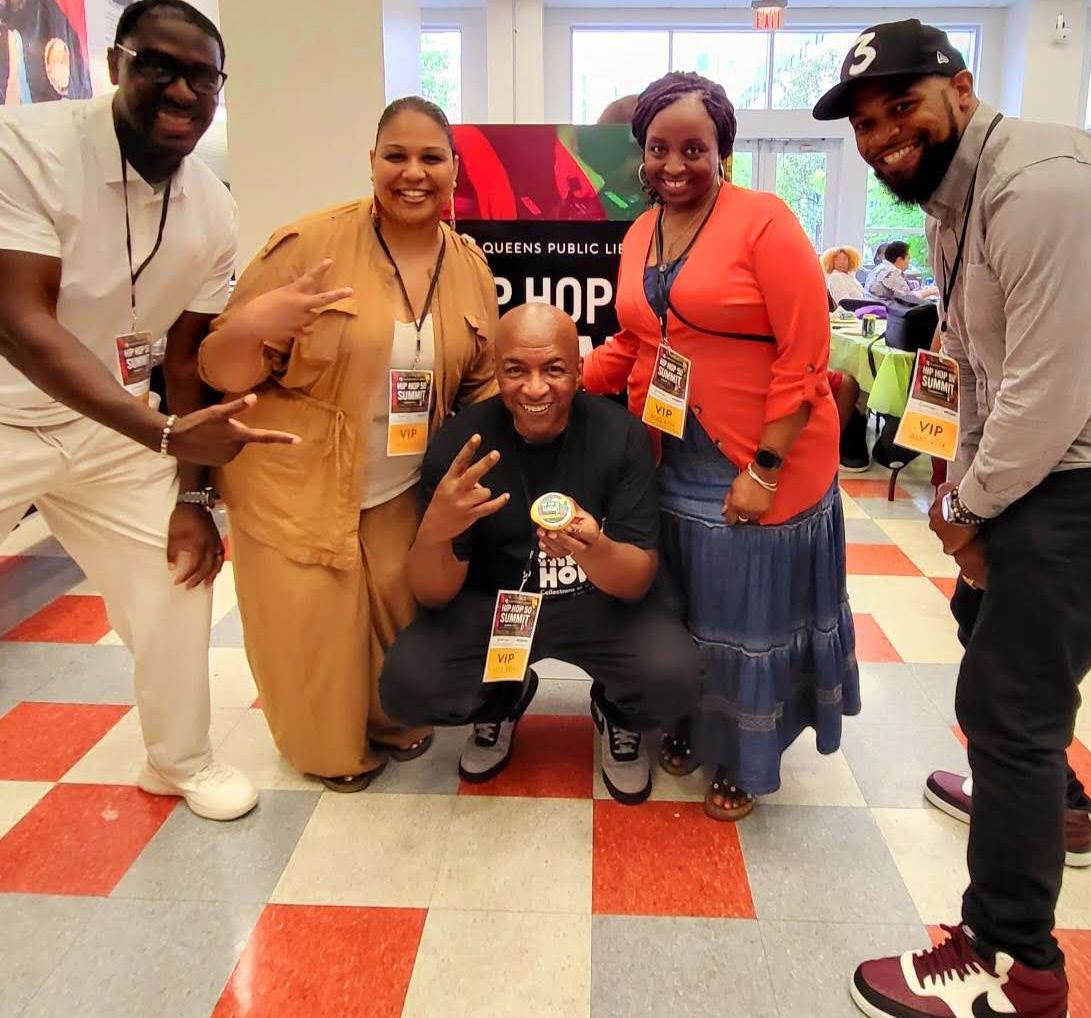
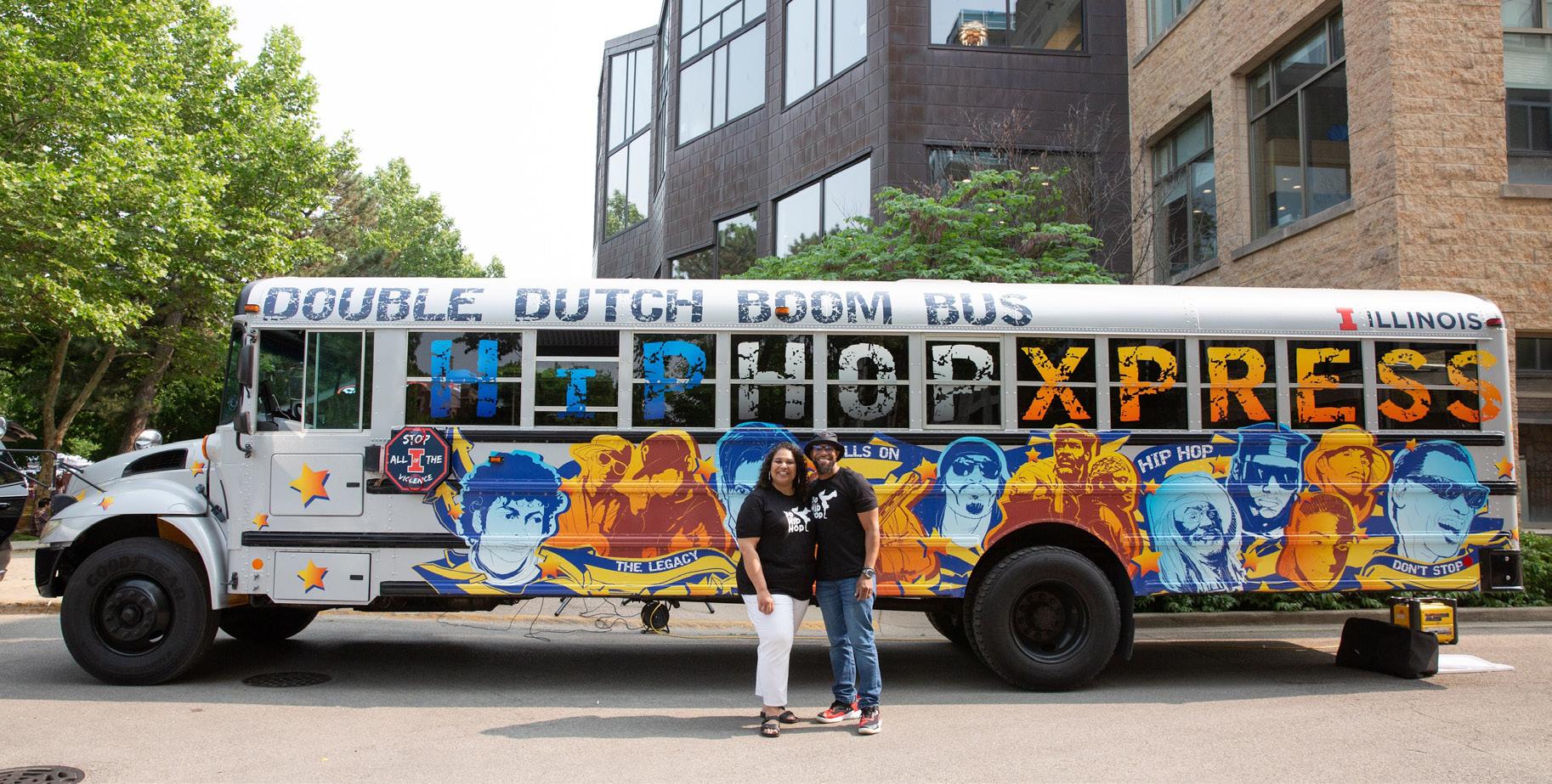


MAIN LIBRARY
834 Lake St. | 708.383.8200
Monday–Thursday: 9 am–9 pm
Friday: 9 am–6 pm
Saturday: 9 am–5 pm
Sunday: 12–5 pm
DOLE BRANCH
255 Augusta St. | 708.386.9032
Monday: Closed
Tuesday–Thursday: 10 am–9 pm
Friday: 10 am–6 pm
Saturday: 10 am–5 pm
Sunday: 12–5 pm
MAZE BRANCH
845 Gunderson Ave. | 708.386.4751
Monday–Thursday: 10 am–9 pm
Friday: Closed
Saturday: 10 am–5 pm
Sunday: 12–5 pm




FALL/WINTER CLOSINGS
Monday, October 9, 2023
All buildings closed all day
Wednesday, November 22, 2023
All buildings close at 5 pm
Thursday, November 23, and Friday, November 24, 2023
All buildings closed all day
Friday, December 1, 2023
All buildings closed all day
Sunday, December 24, and Monday, December 25, 2023
All buildings closed all day
Sunday, December 31, 2023
All buildings close at 5 pm
Monday, January 1, 2024
All buildings closed all day


